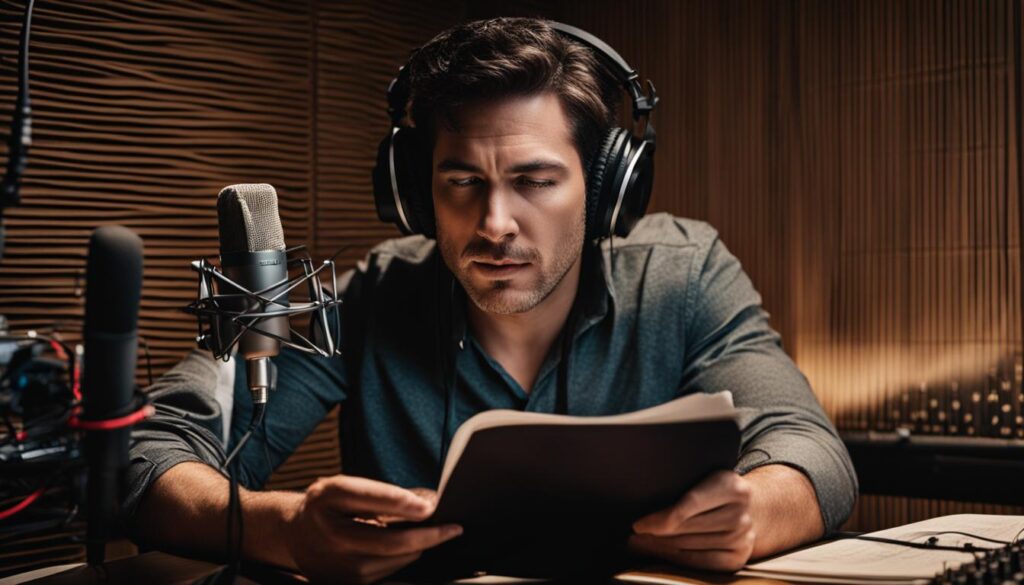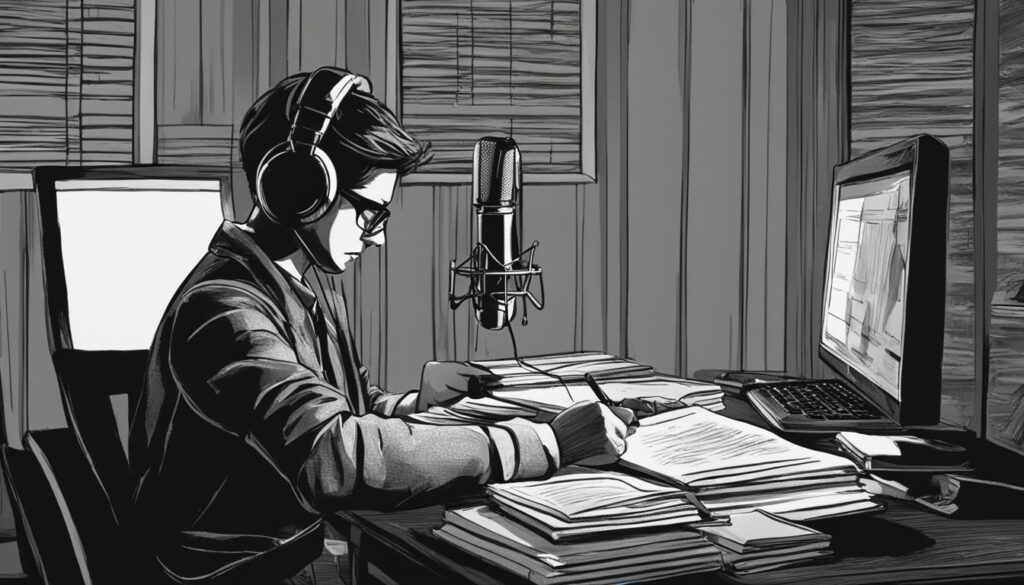Welcome to our article on audiobook narrators and how they handle errors and mistakes during recording sessions. As with any form of storytelling, the recording process can be fraught with challenges, and even the most skilled and experienced narrators face errors and mistakes. In this article, we’ll explore the techniques and strategies that audiobook narrators use to manage and overcome errors and ensure flawless recordings. From minor mispronunciations to major production hiccups, we’ll cover it all in this comprehensive guide to error handling for audiobook narrators.
In today’s highly competitive audiobook market, it’s essential to deliver a powerful and seamless listening experience for your audience. Understanding how to handle errors is a crucial aspect of this process that can make or break your storytelling success. So, let’s dive in and explore the world of audiobook recording and how narrators handle challenges with grace and precision.

Common Types of Errors in Audiobook Recording
Audiobook recording can be a daunting task, even for the most experienced narrators. During the recording sessions, errors can occur, impeding the final product’s quality. Here are the most common types of errors in audiobook recording:
- Mispronunciations: Mispronunciations of words and names can occur, leading to a break in the listener’s immersion. Narrators have to conduct thorough research to avoid these errors.
- Stuttering: Some narrators experience stuttering due to various factors such as nervousness, fatigue, or speech impediments. This can affect the smoothness of the narration.
- Background noise: Recording studios can have background noise like AC’s hum, traffic noise, or other people’s voices that can ruin the recording.
- Technical glitches: Technical problems like mic feedback, computer crashes, or power outages can disrupt a recording session.
The above errors can cause delays, retakes, additional editing, and expenses to the audiobook production team. Narrators must be vigilant and take the necessary precautions to avoid such errors and deliver a seamless listening experience.
Preparing for Error-Free Recording Sessions
Recording an audiobook is a meticulous process that requires careful preparation to achieve error-free results. Audiobook narrators put in significant effort to prepare for the recording sessions, so they can deliver high-quality performances. Here are some strategies that help them prepare for error-free recording sessions:
Script Review
Narrators spend hours reviewing the script, becoming familiar with its content, structure, and characters. They highlight challenging passages, prepare notes, and work on strengthening their understanding of the story’s overall flow. This helps them deliver a more natural and engaging narration, reducing the potential for errors and mistakes.
Pronunciation Research
One of the most challenging aspects of audiobook recording is pronouncing difficult words or names correctly consistently. Therefore, narrators conduct extensive research on pronunciation beforehand, which minimizes the risk of errors and provides a more authentic listening experience.
Vocal Warm-ups
Before recording, narrators engage in various vocal exercises, including breathing techniques, voice drills, and mouth warm-ups. Such exercises help to loosen up the voice box, reduce the chance of mistakes, and ensure the voice is expressive and engaging throughout the recording.
Creating a Comfortable Recording Environment
Narrators create a comfortable and quiet recording environment to avoid disruptions and ensure their focus remains on the task at hand. They adjust the temperature, lighting, and acoustics to create an ambiance that facilitates maximum performance.
By adopting these strategies, audiobook narrators gain the confidence and competency they need to handle challenging aspects of the recording process, allowing them to deliver a flawless narration.
Quick Fixes for Minor Errors During Recording
While recording an audiobook, it’s common to encounter small errors or mistakes that may affect the quality of the final product. Audiobook narrators need to know how to identify and rectify these minor issues efficiently to ensure a smooth recording session. Here are some quick fixes that audiobook narrators often use to handle minor errors:
- Self-Correction: If a narrator realizes they’ve made a minor mistake, they can correct the error and continue recording without pausing or stopping the session. This technique is helpful when the mistake is small and doesn’t require a retake.
- Retakes: When self-correction isn’t enough, the narrator can opt for a retake of the particular sentence or paragraph. This ensures that the minor error is rectified, and there is consistency in the recorded content.
- Editing Software Utilization: Audiobook narrators also use editing software to remove or adjust minor errors that cannot be corrected with self-correction or retakes. This technique streamlines the error handling process and helps achieve an error-free recording.
By utilizing these quick fixes, audiobook narrators can efficiently manage minor errors during the recording process and achieve a polished final product.

Strategies for Handling Major Errors During Recording
When major errors occur during audiobook recording sessions, experienced narrators have several techniques for managing them. First and foremost, it’s essential to remain calm and focused. When dealing with complex passages, it’s often helpful to break them down into smaller portions to ensure that each section is delivered flawlessly.
For character voice errors, narrators may pause and repeat the line until they get it right. Pacing adjustments can also be a challenge, especially when it comes to maintaining a consistent tone or tempo throughout an extended session. To deal with this issue, some narrators take breaks to refocus and recharge, while others turn to relaxation techniques such as meditation or deep breathing exercises.
Clear communication with the production team is also crucial in handling major errors. Narrators can collaborate with directors, producers, or other team members to find solutions to challenging sections. This may involve reworking a character voice or adjusting the script slightly to make it easier to read aloud.
Ultimately, successful error handling during audiobook recording requires experience, preparation, and a calm and focused attitude. By employing these strategies, narrators can deliver exceptional performances even when faced with major errors.
Post-Recording Error Handling and Editing
While recording errors and mistakes are a common challenge faced by audiobook narrators, the post-recording stage is pivotal to ensure the final product is of the highest quality. The editing process is a crucial step in addressing errors and mistakes that may have slipped through during the recording phase.
Collaboration with the production team is essential during this phase to ensure the overall vision of the audiobook is maintained. Professional audio engineers can be utilized to enhance the quality of the recording and eliminate any residual mistakes that may have gone unnoticed earlier.
Overall, post-recording error handling and editing is a crucial stage in ensuring the final audiobook is a polished product that listeners will enjoy for years to come.
Conclusion
In conclusion, error handling is a crucial aspect of audiobook recording that requires careful consideration and preparation. Audiobook narrators face a range of challenges when it comes to errors and mistakes, from mispronunciations to technical glitches and pacing issues. However, with the right strategies and techniques, they can manage and overcome these obstacles to deliver flawless storytelling experiences to listeners.
Preparing for recording sessions, quick fixes for minor errors, and handling major errors are all part of the process of error management in audiobook recording. Additionally, post-recording error handling and editing are also crucial in ensuring a polished final product that meets the highest standards of quality.
Overall, error handling is an essential component of successful audiobook recording, and narrators must be equipped with the skills, tools, and techniques needed to manage errors and mistakes effectively. By prioritizing error management and incorporating it into their recording processes, audiobook narrators can deliver exceptional performances that captivate and entertain listeners.
FAQ
How do audiobook narrators deal with errors or mistakes during recording?
Audiobook narrators employ various techniques to handle errors or mistakes during recording. They may pause and correct themselves, rerecord specific passages, or use editing software to fix minor issues. In case of major errors, they consult with the production team and make necessary adjustments to ensure a high-quality final product.
What are the common types of errors in audiobook recording?
Common types of errors in audiobook recording include mispronunciations, stuttering, background noise, and technical glitches. These errors can disrupt the flow of the narration and affect the overall listening experience. Audiobook narrators strive to minimize these errors through thorough preparation and attention to detail.
How do audiobook narrators prepare for error-free recording sessions?
Audiobook narrators prepare for error-free recording sessions by thoroughly reviewing the script, conducting pronunciation research, and performing vocal warm-ups. They also ensure a comfortable recording environment to minimize distractions. By investing time in preparation, narrators aim to deliver a flawless and engaging audiobook experience.
What are the quick fixes for minor errors during recording?
When audiobook narrators encounter minor errors during recording, they employ quick fixes such as self-correction, retakes, or utilizing editing software. By addressing these minor issues on the spot, narrators maintain the flow of the narration and minimize the need for post-recording edits.
How do audiobook narrators handle major errors during recording?
Audiobook narrators handle major errors during recording by approaching them systematically. They analyze complex passages, make adjustments to character voices or pacing when necessary, and communicate effectively with the production team to ensure cohesive storytelling. Handling major errors requires a combination of skill, adaptability, and collaboration.
What happens after recording in terms of error handling and editing?
After recording, audiobook narrators work closely with the production team to address errors and mistakes. This involves the editing process, where professional audio engineers may be involved to enhance sound quality and remove any remaining errors. Collaborating with the production team ensures that the final audiobook product is polished and error-free.
What is the key takeaway regarding error handling for audiobook narrators?
The key takeaway for audiobook narrators is the importance of effective error handling techniques. By addressing errors and mistakes during recording sessions, narrators can deliver flawless storytelling experiences to listeners. Thorough preparation, quick fixes for minor errors, strategic approaches to major errors, and post-recording collaboration are all essential aspects of error management in audiobook narration.
